ExtremeTemperatures& MentalandCognitiveHealthfor WomeninIndiaandtheUnited States

Swati Bajpai, Ph.D., has been appointed as an Atlantic Fellow at the Global Brain Health Institute located at Trinity College Dublin, within the Department of Neurosciences. This prestigious fellowship is generously funded by UCSF, California. Her pilot project “BrainMileAge: Adaptation and testing the feasibility of multilingual culturally diverse picture based cognitive program for participants with Mild Cognitive Impairment & early dementia” was nominated for presentation in front of the Lord Mayor of London on January 25th, 2024.
Research suggests that there may be a relationship between fluctuations in temperature, aging, and cognition in women, with some studies indicating potential impacts on cognitive function during menopausal transitions.

Érinn C. Cameron, Ph.D. has been appointed as a Fogarty Global Health Fellow in the Harvard TH Chan School of Public Health HBNU Fogarty Global Health Training Program For her Fogarty fellowship, she is investigating the effects of climate change on the mental health and health seeking behaviors of pregnant women living with HIV in Western Cape, South Africa where she has an appointment as a visiting scholar at Stellenbosch University
Drs. Bajpai and Cameron, who became colleagues through their work on the ICP Board over the past three years, are collaborating on an international longitudinal study investigating the effect of extreme temperatures on the mental and cognitive health of older adult women in India and the United States. They are working with data provided by the Health and Retirement Study (HRS) in the United States and the Harmonised Diagnostic Assessment of Dementia for the Longitudinal Aging Study in India (LASI-DAD).
10
THE INTERNATIONAL PSYCHOLOGIST vol. 64 no.01 Early Career Psychologists News C R O S SC U L T U R A L C O L L A B O R A T I O N ECP
Members we invite you to submit items for this space

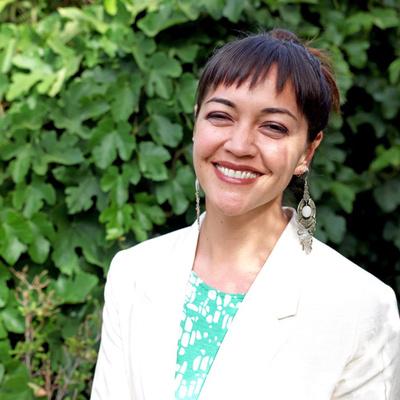
INTRODUCINGICP’S NEWSTUDENT DIRECTOR-AT-LARGE JOQINA’AU
Jo Qina`au (she/they) is a fifth-year PhD student in Clinical Psychology at the University of Hawai`i, currently completing a clinical fellowship at Harvard Medical School’s Department of Psychiatry (Massachusetts Mental Health Center). She is an Indigenous scholar, a therapist in training, and an advocate for the wellbeing of vulnerable peoples (e.g., Indigenous groups, sexual gender minorities, the Global Majority). Her addition to the board will bring enthusiasm for collective liberation on a global scale, informed by contemplative science; feminist, decolonial, and indigenizing methodologies; and a collaborative intuition. She comes from Hawaiʻi, a unique space that is considered both a state of the United States of America and an independent territory illegally occupied by the U.S. (per Article 2(4) of the Charter of the United Nations prohibiting the use of force). Jo’s passion for global mental health is informed by ten years of teaching health psychology, English, and Yoga in London, Thailand, Japan, the Kingdom of Saudi Arabia, the United Arab Emirates, India, and Ireland. During her master’s program, she participated in a 6-day training in Global Mental Health with the Global Mental Health Summer Institute at Teachers College, Columbia University and has certifications in Psychological First Aid and Resilience in Children Exposed to Trauma, Disaster, and War: Global Perspectives. These experiences expanded Jo’s understanding of approaches to mental health in international contexts. They look forward to learning more about the ways in which they can contribute to and learn from the ICP community as a Student Director-at-Large! Please reach out to Jo if you are interested in getting involved with ICP student activities jo.qinaau@gmail.com.
JOQINA’AU STUDENTCHAIR
11 THE INTERNATIONAL PSYCHOLOGIST vol. 64 no.01 Student Corner
items
space.
ICP Student Members we invite you to submit
for this
ICP Inaugurated its First Cohort of Global UN Interns this year
Last fall, ICP issued a call for nominations for graduate students to serve as UN interns with the ICP UN-NGO representatives. An astounding 55 applications were received for the five intern positions. The interns, from Canada, India, the UK and the USA, have now begun their six-month volunteer intern terms. Interns meet biweekly with ICP UN representatives, led by Dr. Elaine Oloaye, as

they are embarking on projects to understand how the UN works, the UN’s influence in their countries, their county’s influence at the UN, and the workings of the Psychology Coalition at the United Nations (PCUN). They are selecting UN NGO committees to follow, and will be available, later in their internships, to field discussions with ICP members about the potentials and realities of psychology at the United Nations.
Presented by The Psychology Coalition at the United Nations (PCUN)
April 25, 2024 11:00 am - 1:30 pm ET
click here 17th Annual PSYCHOLOGY DAY at The United Nations online —All are Welcome—
ICP at the UNITED NATIONS 12 THE INTERNATIONAL PSYCHOLOGIST vol 64 no 01
Submitted by Elaine H. Olaoye with input from ICP UN representatives
The International Council of Psychologists (ICP) Intern program at the United Nations 2023-2024 commenced on January 11, 2024 and will end on June 27, 2024. Notifications were posted in September 2023 and over 50 responses were received This enthusiastic response was winnowed down to 24 applicants by accepting graduate students only
A still more stringent selection process was put in place using a system that allowed the selection committee to judge each applicant on specified criteria, which in turn led to a numerical ranking of students. This second tier selection yielded 8 top ranking applicants. After congratulatory letters went out, two new observations emerged. We had many students who were not domiciled in New York, and then subsequent to their selection,, the two students. who were in New York, respectfully declined. For the first time the program had no one living in New York or in a commutable state.
This new global configuration invited a new model for conducting the internship program. It invited some international dialogue among interns from different countries, examining how psychology can help, helps, and does not help the United nations meet its very many international goals
The ICP team finally chose six excellent graduate students, one from the University of Birmingham in the UK, one from McGill University in Canada, one from Howard University , Washington, one from the Professional School of Chicago and two from Jindal Global University , India.
Interns were able to adjust their schedules given the challenge of differing time zones. We meet on the 2nd and 4th Thursday of every month, The 2nd Thursday of the month is reservedfor two speakers addressing topics such as the history and function of ICP by Dr .Bullock; Dr. Sandis a refugee, who shared her life time work and commitment and founder of a refugee NGO on migration.

Our Washington intern revealed during the Q&A that she works in this area and has joined the NGO at the UN on migration. Other speakers will include Dr. Takooshian , Dr Velayo, Dr. Denmark, Dr. Twose on topics to include history of psychology at the UN, the structure and functioning of the UN , APA at the UN, and more
Interns have been introduced to and encouraged to join NGOs related to their interests or specialization. And have done so. March is month where they are encouraged to attend some of thehundreds of Commission on the Status of Women (CSW 68) events, with related opportunities to engage in an amazing diversity and array of UN presentations and activities. Interns may have an opportunity to help with a celebration of International Day of Happiness by PCUN which falls on March 20, each year. Interns are required and have been attending PCUN general meetings every month. This provides opportunities for interns to meet with different psychology organization leaders or representatives. Interns can work with some of them after PCUN in breakout sessions after the main meeting.
Interns are also responsible for keeping a journal of their experiences and activities so that they can more readily share their experiences and ideas in scheduled discussion sessions as well as in responding to the many speakers during the Q & A sessions that follow
Interns will be expected to help with global activities in particular Psychology Day 2024, and will be expected to create and share a plan for publicizing this event at their university.
Attendance has been excellent, perfect each session, ICP Representatives have assumed varying roles which are working well and result in a warm and stimulating experience for all interns. One intern, queried us regarding opportunities to come to New York with housing arrangements and capability to do some work at the UN. … Something for the ICP Board to consider for future programs?
13 THE INTERNATIONAL PSYCHOLOGIST vol. 64 no.01
UNITED NATIONS ELAINEH. OLAOYE ICPUNREP
ICP INTERN PROGRAM REPORT 2024 ICP at the
PSYCHOLOGY AND MIGRATION AT THE UN: A Conversation with ICP UN interns
Eva E Sandis, Ph.D Chair Emerita, NGO Committee on Migration
In recognition of ICP’s exciting new UN internship training program, this is a brief account of a recent meeting with our new interns 2 from India, 1 from the UK, 1 from Canada, and 2 from the U.S. that took place in an effort to acquaint them with the interrelationship between psychology and important issues in this case, migration-- dealt with at the United Nations.
HISTORY
When I joined ICP in the1990s, neither psychology nor migration were recognized at the United Nations. That changed radically when Kofi Annan became Secretary General of the UN, a position he held for 2 successive five year terms, from 1997 to 2006. He insisted that Member States could no longer ignore migration, especially as it impacts development, and he called for and presided over the first ever High- Level Dialogue on Migration at the United Nations in New York in 2006
Because of the contributions of ICP and other NGOs as a subcommittee of the NGO Committee on Human Rights---we were encouraged to become an independent, fully accredited NGO Committee on Migration, and we did so The Committee’s 3 founding mothers (and first officers) were: Rosita Resnick, a migrant from Argentina, the Chair; myself, a refugee from Austria, Vice Chair; and Eva Richter, a refugee from Germany, the Treasurer.
FAST FORWARD TO TODAY MEMBERSHIP
Our Committee is a membership driven worldwide coalition of over 50 NGO networks and organizations who act directly with UN Member States and UN processes for the promotion and protection of migrants’ rights. Many of us are migrants, refugees, diaspora, or their family members

Our members include humanitarian and religious organizations, women’s and child rights NGOs, and professional organizations of social workers, nurses, legal experts, and of course psychologists. Among them are members of APA, SPSSI, and our own ICP. We particularly appreciate collaboration of the internship team here – Drs Elaine Olaoye, Janet Sigal, Leslie Popoff, Elizabeth Kloner and, of course, Merry Bullock
ADVOCACY PRIORITIES
The NGO Committee has, from its beginnings, focused on the protection of migrants and their human rights in accordance with the UN Charter. Our advocacy activities encompass assistance to migrants in vulnerable situations, especially migrant and refugee children:
In countries of origin, as a result of climate change and displacement; In transit, because of mixed migration, border closings, smuggling and trafficking; and In countries of destination, coping with racism and xenophobia, with lack of access to services, especially health and education; with detention; and with the endemic traumas often multiple and serial associated with these.
THE MENTAL HEALTH CONNECTION
Let me underscore the mental health connection with migration Indeed, almost all the circumstances that migrants face can, and often do, generate depression, trauma, and mental health crises among refugees, migrants, and their families, especially those vulnerable prior to migrating---and genuinely forced to migrate because of persecution, poverty, family separation, etc Accordingly, the NGO Committee pushes for mental health solutions to assist those in need of competent care, along with solutions that eliminate the circumstances that cause the suffering solutions such as regular pathways,
EVASANDIS ICPUNREP
UNITED
ICP at the
NATIONS
14 THE INTERNATIONAL PSYCHOLOGIST vol 64 no 01
regularization of status, and access to basic services , especially health and education.
CONNECTING MIGRATION AND PSYCHOLOGY:
3 specific examples of Committee Activities
EXAMPLE 1
Monthly Meeting on Psychology and People on the Move
Last April, coinciding with Psychology at the UN month, we organized our NGO Committee’s meeting on the topic of Psychology and People on the Move. The idea was to explain to an audience of migration activists how psychologists, in different ways, act as healers of the many mental health issues migrants and refugees are exposed to, and have to endure as they are forced to engage on dangerous journeys, leave their homeland, and deal with situations in countries of transition and destination.
We were fortunate to have our own Dr Rashmi Jaipal give a description of psychology as it relates to migration, noting especially the role of Clinical Psychology and Cross-cultural Psychology, and sharing recommendations for national governments, especially on getting past xenophobia for example via joint community initiatives. I should add that this is not a one-way street. We try to keep our psychologist colleagues informed, at ICP Webinars, ICP Conventions, and through ICP news media, about the migration and other UN activities in which we are engaged
EXAMPLE 2
Human Rights Council Resolution On Migrants in Transit
Another Committee activity involving the intersection of Migration and Psychology was our strong support of Mexico’s Resolution on the Human Rights of Migrants in Transit last June, during the 53rd Session of the UN Human Rights Council in Geneva
With our support – and that of NGOs on both sides of the Atlantic –the Resolution was passed by unanimous consent of the participating Member States, and we received a big thank you from Mexico’s Representative in Geneva.
Psychologists, too, are strong advocates for Human Rights There is the Global Network of Psychologists for Human Rights, of which Merry Bullock is Co-Chair; and a Webinar Series on Human Rights and Psychology, including a recent Session on Core Values of a Human Rights-based Psychology.
EXAMPLE 3
Call to Reverse New York City’s Devastating Migrant Housing Policy
Our NGO Committee’s latest activity in January has been an urgent call to reverse New York City’s current devastating housing policy, which forces recently arrived asylum seeking families to find alternative shelters after 60 days, placing them at risk for homelessness, denying the children access to continuing education, and disrupting the families’’ ability to pursue legal status in the United States.
The eviction process has been traumatic for a population already recovering from the challenge of a long migration journey; It is a systematic violation of migrants’ human rights; and It places migrant students at risk for falling behind or suffering psychologically
The Committee sent a letter to the Adams Administration calling for a reversal of its current housing policy and is monitoring developments
ICP at the UNITED NATIONS 15 THE INTERNATIONAL PSYCHOLOGIST vol. 64 no.01
Featured Articles
INTERNATIONAL COMPETENCIES FOR UNDERGRADUATE PSYCHOLOGY (ICUP)
Susan A. Nolan, Seton Hall University, South Orange, New Jersey, USA, susan nolan@shu edu; and Jacquelyn Cranney, University of New South Wales, Sydney, Australia; j cranney@unsw edu au; Co-leaders of the International Collaboration on Undergraduate Psychology Outcomes (ICUPO)
International Competencies for Undergraduate Psychology (ICUP)–a movement whose time is now! The discipline of psychology is increasingly international, with ever-rising numbers of psychology educational programs (Shealy et al , 2023; Takooshian et al., 2016). This shift highlights a growing need for a means to communicate effectively about psychology education across countries and regions; to support collaboration across programs, degrees, and faculty; and to facilitate mobility across borders. There have been many international higher education projects aimed at such goals, including broad frameworks not specific to a particular discipline (e.g., OECD Future of Education and Skills 2030, 2023) as well as frameworks specific to psychology, albeit aimed at professional psychology programs (e.g., Core Competences in Professional Psychology, IPCP, 2016, n.d.). Prior to the current project, however, there have not previously been frameworks or competences at the undergraduate foundational level. In an attempt to fill that gap, we initiated the International Committee on Undergraduate Psychology Outcomes (ICUPO), the central committee that drafted the International Competences for Undergraduate Psychology (ICUP).
Before we outline the current project, we share definitions for professional psychology and foundational psychology competences to distinguish the current work from previous projects focused on professional psychology.
A professional psychology competence is a “‘combination of practical and theoretical knowledge, cognitive skills, behaviour, and values used to perform a specific behaviour or set of behaviours to a standard, in professional practice settings associated with’ an advanced professional psychology role (based on IPCP, 2016, p.4)” (Nolan et al., in prep, p. 15).
A foundational psychology competence is “a specific behaviour or set of behaviours performed to a
standard, within personal, work, or community contexts; these behaviours are underpinned by practical and theoretical knowledge, cognitive skills, attitudes and values. A foundational level of competence indicates that graduates will have broad and coherent knowledge and skills that can be further developed as professional psychology competences in advanced UG or graduate programs.” (Nolan et al., in prep, p.14).
Undergraduate programs seek to develop foundational psychology competences. In some nations, undergraduate programs then also develop professional psychology competences. In other nations, professional psychology competences are developed at the post-graduate/graduate level.
The International Committee for Undergraduate Psychology Outcomes (ICUPO)
The aims of the current ICUPO project were to: “(a) produce an international foundational psychology competence model for the undergraduate level; (b) encourage/support adaptation of the model to local, national, and regional contexts, with the model serving as guidance only; and (c) seek support for the model from international and national psychology-relevant organisations and leaders” (Nolan et al., in prep, p.3)
This project began in 2020 when the authors, Susan Nolan and Jacquelyn (Jacky) Cranney, discussed the possibility of working on the general aims above We were concerned that the value of undergraduate psychology education, particularly for the many students who do not become professional psychologists, was being questioned (e g , Halonen, 2011)
We were interested in creating an international undergraduate psychology outcomes model that could be used to inform national and institutional curricula for all undergraduate psychology students, and especially, to articulate the valuable competences that
17
THE INTERNATIONAL PSYCHOLOGIST vol. 64 no.01
these students obtain, in relation to psychological literacy and global citizenship (Cranney et al., 2022b). The idea of an international committee to pursue these aims was expressed in a 2022 publication co-written with colleagues Dana Dunn, Julie Hulme, Sue Morris, and Kim Norris (Cranney et al., 2022a). The first aim has been realised with the creation of the International Competences for Undergraduate Psychology (ICUP; Nolan et al., in prep; preprint available at osf.io/6y38x/).
Brief Overview of Structure and Processes
We started working intensively on planning ICUPO in August 2022, and held the first ICUPO Committee meeting in October 2022. Since that time, ICUPO Committee virtual meetings have been held on average, every 6 weeks. At the October 2022 meeting, it was decided that working groups would be established, and on average, approximately 4 working group meetings occur between ICUPO meetings. That is, the work pace has been intense since August 2022.
Based on international experiences, contacts, and relevant literature, we identified and invited ICUPO members. There are currently 17 members from 13 nations. We also formed a larger International Reference Group on Undergraduate Psychology Outcomes (IRGUPO) advisory group, which currently has 103 members from 39 countries. IRGUPO members were similarly invited, with additional suggestions on diversity, particularly geographic diversity. So far there have been four formal engagements with IRGUPO, with the Fourth Engagement being an intense consultation regarding the Alpha.R1 Version of ICUP, which then led to revisions to produce the Beta Version.
A number of IRGUPO members have been ICP members and leaders, and we are grateful for their valuable contributions. Note that, similar to the IPCP (2016, n.d.) which produced the international set of professional psychology competences, ICUPO is not associated with any national or international organisation, and there is minimal funding (e.g., $5000 from the Association for Psychological Science to five ICUPO members; a U.S. Fulbright Scholar Award for Susan Nolan to work with Jacky Cranney at the
University of New South Wales in Australia). All ICUPO Committee and IRGUPO members have generously volunteered their time and expertise.
There were a number of inputs that contributed to the creation of the ICUP. An extensive literature search, as well as consultation with ICUPO and IRGUPO members, produced 27 sets of national learning outcomes (competences) for undergraduate psychology, as well as several other international and disciplinary models and frameworks that informed the ICUPO Committee’s work. Extensive processing of this information was undertaken as ICUPO members began to think about drafting competences, and a Principles for Drafting Competencies document was created. Two draft competence model ‘options’ were then developed by individual ICUPO members, followed by an iterative, consensus-seeking process of integrating these models. Stakeholder feedback, particularly from IRGUPO, was vigorously sought, and continuing revisions undertaken to produce the Beta.R1 version (osf.io/6y38x/). Gaining agreement on this Beta.R1 version of ICUP was both challenging and rewarding, taking more than a year of very intense activity.
Current Status
At the present time, we are engaged in outreach to international and national psychology organizations, particularly those with an interest in psychology education, as well as to interested psychology educators from around the world. We are developing a website (https://blogs.shu.edu/icupo/) that provides links to the Beta.R1 model as well as a contact page where psychology educators may offer their input. We will elicit input through until 7 May 2024, and then revise the Beta.R1 model prior to the International Congress of Psychology (ICP) conference in Prague in July 2024. We encourage you to provide feedback via our website. We also invite you to email us (susan.nolan@shu.edu) if you will attend ICP in Prague, where there will be opportunities to engage in discussion about the ICUP.. We thank ICP members who have already contributed to the development of the ICUP, and we invite all of you to share your experience and expertise to improve the model
18
Featured Articles
THE INTERNATIONAL PSYCHOLOGIST vol. 64 no.01
VICARIOUS TRAUMA IN MENTAL HEALTH PROFESSIONALS TREATING SURVIVORS OF SEXUAL ASSAULT IN SOUTH AFRICA
INTRODUCTION
Vicarious trauma (VT), sometimes referred to as secondary traumatic stress (STS), describes the enduring negative emotional and psychological effects experienced by individuals who work with traumatized individuals (Hesse, 2002; Molnar et al , 2017) Understanding the prevalence of VT among mental health clinicians is crucial, given their ongoing exposure to traumatic events and the amplified empathy they employ to assist patients, which elevates the risk of VT.
Globally, traumatic events are associated with approximately 5 million deaths annually, with nearly 90% occurring in low and middle-income (LMIC) countries, including South Africa (Swain et al., 2017). In South Africa, high rates of physical abuse, sexual assault, and violence contribute to a widespread prevalence of traumatic events. The South African Stress and Health Survey has reported a lifetime exposure to at least one traumatic event reported for 73.8% of the South African general population, prompting many affected individuals to seek support from mental health professionals (Atwoli et al., 2013; Atwoli et al., 2015; Koenen et al., 2017).
Mental health professionals who work with trauma survivors are exposed to the pain and fear of victims, potentially leading to VT. Coined by McCann and Pearlman (1990), VT is a construct that arises due to the cost of caring for others that leads to alterations in the inner experience of a psychologist. Existing literature aligns the psychological process of VT with the symptomatology of posttraumatic distress, akin to the experiences of directly traumatized victims.
These symptoms encompass re-experiencing the event, persistent avoidance, increased arousal, and impairment across a clinician's physical, social, professional, and personal domains (Miller & Izzo, 2010; Sui & Padmanabhanunni, 2016).
METHOD
A scoping review was conducted in October 2022 Key search terms included "vicarious trauma," "secondary traumatic stress," “South Africa,” "psychologists," "sexual assault " Additional keywords such as "rape" and "sexual harassment" were linked to "sexual assault," while "clinician" and "therapist" were associated with "psychologist." The literature search was conducted using electronic databases such as Google Scholar, Taylor & Francis Journals, Scopus, PubMed, Web of Science and Science Direct. Since so few South Africa studies (N = 3) exist on this topic, the search was expanded to include studies from all countries.
Inclusion criteria included peer-reviewed literature published 2000 – 2022, and English language only (including translated works). Only papers that directly referenced VT or STS were included. Out of an initial 1480 results, 49 articles met the inclusion criteria and formed the foundation for the literature review.
RESULTS
Prevalence of VT
Numerous studies underscore the psychological distress experienced by professionals exposed to vicarious trauma, including first responders, medical providers, psychologists, and other mental healthprofessionals (Berger et al., 2012; Bride, 2007; Bride et al., 2007; Choi, 2011; Cronje & Vilakazi, 2020; Ivicic & Motta, 2017). Prevalence rates of VT vary across professions (Molnar et al., 2017). However, there is a scarcity of studies specifically targeting mental health professionals in South Africa who assist victims of sexual trauma. Therefore, one must rely on insights drawn from international literature to address this gap.
While VT and STS are prevalent in many professions, rates among mental health professionals are staggering. For example, Choi (2011) reported a 21% prevalence of STS among social workers specializing in treating victims of sexual violence in 2011.
19
Briefs
THE INTERNATIONAL PSYCHOLOGIST vol. 64 no.01
Ms. Bailey Allen, BA honours, Masters student in Research Psychology, Stellenbosch University, South Africa
Ivicic and Motta (2017) conducted a study encompassing a spectrum of mental health professionals licensed clinicians, social workers, counselors, and creative art therapists engaged in trauma work.Their findings indicated a higher prevalence of secondary trauma at 22.7%, as measured by the Secondary Traumatic Stress Scale (STSS). Furthermore, a recent systematic review examining the aggregated prevalence of STS in professionals and volunteers aiding forcibly displaced individuals who have undergone trauma revealed a total STS prevalence of 45.7% (Roberts et al., 2021). The review noted that nearly half of the participants reported moderate-tosevere levels of STS (Roberts et al., 2021).
In South Africa, there is evidence indicating that mental health professionals experience adverse effects from their work. Peltzer et al. (2014) discovered in their study of lay HIV counselors that STS was prevalent in 51.4% of participants. Ortlepp and Friedman (2002) similarly noted that 10% of lay trauma workers, trained to support bank employees after a robbery, reported experiencing high levels of STS. Moreover, Booysen and Kagee (2021) conducted a qualitative study on nonspecialist health workers in South Africa, revealing the risk of VT due to vivid descriptions of traumatic events shared by clients. These findings emphasize the importance of investigating VT among mental health professionals in South Africa, particularly those working with victims of sexual trauma, given the high rates of sexual assault in the country.
EXPERIENCES OF VT
Physical experiences
In examining symptoms of VT among clinicians, three qualitative studies (Felt, 2021; Padmanabhanunni & Gqomfa, 2022; Sui & Padmanabhanunni, 2016) found experiences such as flashbacks, disturbing dreams, and overwhelming thoughts related to traumatic patient narratives. A study in 2013 (Branson et al., 2014) suggested a potential decrease in sexual desire among health clinicians dealing with VT.
This finding was corroborated by Padmanabhanunni and Gqomfa (2022), who highlighted South African therapists struggling with sexual intimacy due to triggering memories of patient trauma. Notably, one clinician reported experiencing vaginismus, resulting in painful intercourse. Additionally, clinicians reported various physical reactions heart palpitations, exhaustion, stomach pains, headaches, migraines, sore muscles, and neck tension both before and after dealing with trauma patients (Padmanabhanunni & Gqomfa, 2022; Sui & Padmanabhanunni, 2016).
Social experiences
Individuals experiencing VT often avoid relationships and have difficulty finding enjoyment (Lerias & Byrne, 2003). Among male therapists, the most prevalent symptom is avoidance, leading to reluctance to spend time with friends due to impatience with insincere interactions (Felt, 2021). In the case of female clinicians, studies suggest a tendency to avoid unsafe locations and display pronounced mistrust, particularly when dealing with sexually traumatized patients (Padmanabhanunni & Gqomfa (2022); Sui & Padmanabhanunni, 2016). Symptoms of avoidance and mistrust resulting from clinical work can significantly impact a clinician's social and professional life.
Professional experiences
Female psychologists reported avoiding certain wards in order to not deal with trauma victims, as well as ending therapy sessions early to prevent a full narration of the distressing details of sexual assault (Padmanabhanunni & Gqomfa, 2022). Male therapists have reported becoming uninterested in the in-depth stories of trauma victims and did not pay sufficient . ttention to the patient during the therapy session (Felt, 2021). Studies indicate that symptoms of VT can be ameliorated through psychoeducation aimed at expanding coping responses to VT among mental health professionals (Kim et al., 2022).
20 Briefs .
THE INTERNATIONAL PSYCHOLOGIST vol. 64 no.01
Vicarious trauma in mental health professionals treating survivors of sexual assault in South Africa- cont’d
Personal experiences
Pearlman and MacIan (1995) defined VT as a change in how one experiences the self and the world after being indirectly exposed to an event This definition holds true in clinician’s personal lives, as several participants reported shifts in the way they view the world, particularly in areas such as safety and benevolence Barros et al (2020) found that 56 forensic psychiatrists and psychologists experienced altered feelings of security, leading to distrust of strangers and overprotectiveness toward their families Similar mistrust of men among female clinicians affected parenting approaches (Padmanabhanunni & Gqomfa, 2022). This distorted worldview triggered dominant negative emotions such as sadness, anger, irritability, discouragement, discomfort, and powerlessness in mental health professionals (Barros et al., 2020; Sui & Padmanabhanunni, 2016).
DISCUSSION
This review revealed a significant research gap in addressing the prevalence of VT as a distinct phenomenon among mental health professionals in South Africa. The focus is even scarcer on psychologists treating victims of sexual abuse, with only two published studies in South Africa (Padmanabhanunni & Gqomfa, 2022; Sui & Padmanabhanunni, 2016).
Additionally, the prevalent use of small sample sizes, hindering the generalizability of findings to the broader South African context and impeding accurate representation of the population. Furthermore, a common critique of previous studies is the skewed representation of predominantly female participants. This gender bias results in an incomplete depiction of VT experiences among male clinicians dealing with trauma victims in South Africa.
FUTURE STUDY RECOMMENDATIONS
This review provides a foundation for future research to delve deeper into the nuanced experiences of VT among mental health professionals in South Africa Subsequent investigations should explore contextual factors that may amplify or mitigate VT Given the urgent need for more research on VT among men clinicians in South Africa, comparative studies involving both men and women clinicians could offer valuable insights into gender-specific manifestations of VT Additionally, studies are needed to address unique sociocultural factors.
In conclusion, research highlighting the experiences of VT among mental health professionals who work with survivors of sexual trauma are limited, especially in South Africa where rates of sexual assault are high. Mental health professionals are placed in a vulnerable position when vicariously traumatized as their physical, social, professional, and personal lives become negatively impacted . These challenges should be diagnosed and evidence-based interventions should occur before the professionals realize the adverse symptoms associated with VT. Given the high rates of sexual assault in South Africa, and established vulnerability for VT in this population, there is an urgent need to examine coping strategies and culturally-informed prevention and intervention strategies.
REFERENCES
21
Briefs
THE INTERNATIONAL PSYCHOLOGIST vol. 64 no.01 QR
Vicarious trauma in mental health professionals treating survivors of sexual assault in South Africa-
cont’d
RESEARCH SHARING CIRCLES: COMMUNITY-GUIDED QUALITATIVE DATA COLLECTION
Jacob van Haaften & Curve Lake Cultural Centre, Trent University, Ontario, Canada; Curve Lake First Nation
ABSTRACT
This brief explores the data collection method of research sharing circles in the context of psychological research with Indigenous participants Specifically, we discuss a current research project based on a master’s thesis and conducted in collaboration with Curve Lake First Nation, and Indigenous nation in Southern Ontario, Canada We describe the history and etymology of research sharing circles before providing a case study of how they may be implemented in future psychological research The case study explored is based on the first author’s master’s thesis, which explored connection to land and nature in the Curve Lake community with a focus of decolonizing current environmental psychology methods
The Nature Relatedness Lab, run by Dr. Lisa Nisbet, investigates the intersections between subjective connection with nature, well-being, and sustainability behaviours Specifically, the lab explores the psychometric scale of nature relatedness (Nisbet et al , 2009) This scale is based on Likert questions and provides the participant with a quantitative representation of their connection with nature This score is then used in statistical analyses to determine how subjective connection with nature is related to a variety of outcomes
At the onset of the MA research, understanding nature connection in the Curve Lake community was central to the project However based on the controversial nature

Like Danto, as a settler academic, I (Jacob) knew that I had to approach my master’s thesis (MA) research project with Curve Lake First Nation in a way that was beneficial for the community and that was sensitive to the historical extractive nature of research conducted with Indigenous populations (Latulippe & Klenk, 2020; Simpson, 2017; Thomas, 2021). The goal of the research project was to understand how Curve Lake First Nation members connect with the natural world. The inspiration for this project lay in my background working in an environmental psychology lab in my undergraduate degree.
This brought up the question of how we could capture the data needed to create such a tool. As the researchers associated with this project were not experts in Michi Saagiig (the Anishinaabe nation Curve Lake is part of), it was clear that we needed to consult with local experts. Initially, interviews were proposed, but they were quickly discarded as members of the community ethics committees felt that community members might not feel comfortable sharing honestly
Briefs
THE INTERNATIONAL PSYCHOLOGIST vol. 64 no.01
22
Research Sharing Circles: Community-Guided Qualitative Data Collection- continued
and fully in a one-on-one interview with an “outsider.” This led us to group-based qualitative data collection methods, and eventually, research sharing circles.
Research Sharing Circles
Research sharing circles are based on “sharing circles,” which are a common practice in many Indigenous communities across Turtle Island (North America). Sharing circles are used when there is a need for community consensus on a decision or when community leaders need guidance from knowledge holders or other people in the community who are invested in the project (Tachine et al., 2016).
Research sharing circles can be compared to focus groups in that they involve the capturing of qualitative data from a group of individuals, who can engage with each other during the data collection process. However, they do not follow the "focused interview” approach (Merton & Kendall, 1946) of traditional focus groups. Instead, they encourage the researcher to become engaged in the conversations and add their own voice to the data (Tachine et al., 2016). This methodology is especially beneficial when the researcher holds knowledge that is fundamentally different (in an academic sense) from the participants. In the case of this research project, the participants held substantial knowledge about Michi Saagiig connection to nature and the land, and the researcher had a strong background in environmental psychology theories and measures of nature connection.
Conducting Research Sharing Circles: A Case Study
Before describing how the research sharing circles were conducted for this research project, it is important to note that these are not instructions for conducting this data collection method with all Indigenous populations. It is critical for all researchers working with Indigenous populations to consult with and listen to their participants and community ethics committees. Likewise, while sharing circles are common in many Indigenous nations, they are not universal, and this data collection method may not be appropriate for all qualitative research with Indigenous Peoples.
Location
For research sharing circles to be effective, it is crucial for participants to feel safe in the physical environment where the research takes place. In some cases, this might be achieved through using online communication technologies so participants can engage from the comfort of their own homes. In other cases, however, participants might prefer to meet in a well-known space in the community. The research sharing circles for this project were conducted at the Curve Lake Cultural Centre.
Protocols
Research sharing circles must be conducted in a way that adheres to community protocols. These protocols will vary between communities, and it is important to consult with community liaisons about how these protocols will be met. For this research project, protocols included providing food to participants during the research sharing circles, beginning the research sharing circles with ceremony (specially, a smudge), and having a designated support person from the community present to provide psychological, emotional, and spiritual support should topics come up in the research sharing circles that participants might find difficult. This final protocol is likely to be particularly important in research involving colonial histories, mental health, or cultural loss.
Structure
Unlike focus groups, research sharing circles do not rely on prompts or predetermined questions from the researchers. While this may seem daunting, it is important for the data to be organic, and that the researcher is able to engage meaningfully and honestly in the discussions. Yet, it is also important for the research sharing circles to be productive in terms of data collected. This means that, while the researcher may not have specific questions lined up, they may have overarching themes that they want to address.
Briefs THE INTERNATIONAL PSYCHOLOGIST vol. 64 no.01 23
Research Sharing Circles: Community-Guided Qualitative Data Collection- continued
In this research project, we were interested in learning about how people in the community connect with nature and the land Therefore, we wanted to make sure that we had discussions around topics such as subsistence activities, land ceremonies, and land-based knowledge. We were also interested in learning about how different colonial forces have impacted the way community members connect with nature. Therefore, we conducted substantial background research prior to the research sharing circles to become aware of different events that may have affected relationships with the land.
End Product
Equally important as the way data collection is conducted is how the data is presented. In research with Indigenous Peoples, it is crucial to make data accessible. Therefore, there is a need for community presentations and knowledge translations. However, researchers must also consider their data analysis strategies because of the history of Western theories being used to describe or account for knowledge and data that they cannot properly address. Simply put, Indigenous Knowledge cannot always be understood through traditional academic analysis methods.
One solution for this is to ask the community if they have established data analysis methods. In this research project, the community suggested implementing a Medicine Wheel framework to understand the ways people connect with the land mentally, physically, emotionally, and spiritually. The Medicine Wheel has been used for similar purposes for generations in many Indigenous nations (MashfordPringle & Shawanda, 2023), and it fits this project well. In this project, the elements of being, including the mental, physical, emotional, and spiritual were used for deductive coding of transcripts in the context of connection with land.
Overall, it is important to consider whether traditional academic data analysis strategies are appropriate for the research project, and the best way to do this is to ask community knowledge holders
Conclusion
In this brief, we have outlined the data collection technique known as research sharing circles. We have provided impetus for their use in psychological research with Indigenous Peoples, discussed their history, and provided guidance on how future researchers might approach this technique. However, this brief should not be considered a comprehensive guide for conducting research with Indigenous Peoples nor direct instructions for implementing research sharing circles. Researchers must always engage with the community or group they wish to collaborate with and heed their advice and guidance.
REFERENCES

Briefs
THE INTERNATIONAL PSYCHOLOGIST vol 64 no 01 24 QR

Bhagwasia M., Rao A. R., Banerjee J., Bajpai S., Raman A. V., Talukdar A., Jain A., Rajguru C., Sankhe L., Goswami D., Shanthi G. S., Kumar G., Varghese M., Dhar M., Gupta M., A-Koul P., Mohanty R. R., Chakrabarti S. S., Yadati S. R., Dey S., Dey A. B. (2023). Association between cognitive performance and nutritional status: Analysis from LASI-DAD. Gerontology Geriatric Medicine ;9:23337214231194965.
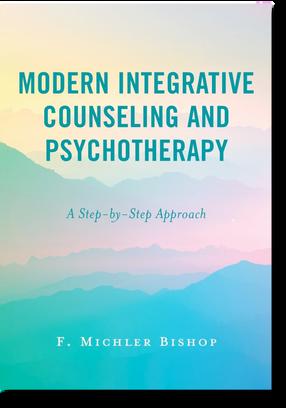


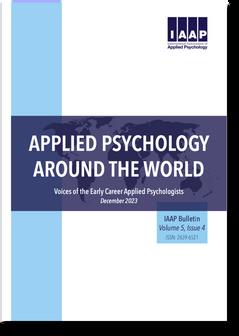
Bhagwasia M., Rao A. R., Banerjee J., Bajpai S., Khobragade P. Y., Raman A V , Talukdar A , Jain A , Rajguru C , Sankhe L , Goswami D , Shanthi G S , Kumar G , Varghese M , Dhar M , Gupta M , A-Koul P , Mohanty R R , Chakrabarti S. S., Yadati S. R., Dey S., Lee, J., Dey A. (2023). Defining anthropometric thresholds (mid-arm circumference and calf circumference) in older adults residing in the community: a crosssectional analysis using data from the population representative Longitudinal Aging Study in India (LASI DAD). BMJ Open, 13(12):e077530. doi: 10.1136/bmjopen-2023-077530. PMID: 38151275; PMCID: PMC10753742.
Bishop, F. M. (2023). Modern Integrative Counseling and Psychotherapy. Rowan & Littlefield
Bullock, M. & Zuniga, C. (2023). Internationalization of Psychology: Indicators, Challenges, Benefits and Risks. Trends in Psychology, 31(1), 447-452.
Cameron, É. C., Toussaint, L., Balfour Adjei, S., Crawford, J. N. Mounet, O., Trend-Cunningham, & Jacquin, K.M. (2024). Finding meaning in crisis: Gender, trauma symptomatology, and spiritual practice impact posttraumatic growth in COVID-19 Ghana. Journal of Research in Psychology, (2), 1. 1-28.
Fukuhara, M. (2024). Dignity of the individuals from the standpoint of reciprocal communication – Past, present and future perspectives. IAAP Bulletin, 5(4), 14-35
THE INTERNATIONAL PSYCHOLOGIST vol. 64 no.01
25
Recent Member Publications

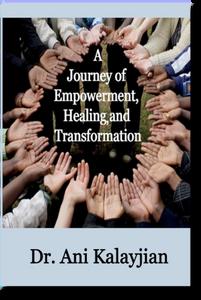

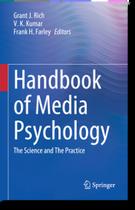
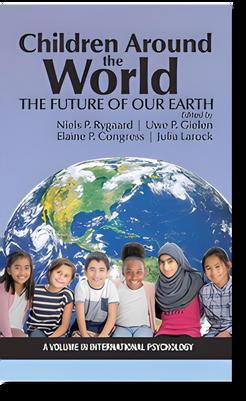
Guil Bozal, A. (2023). Mujeres en los orígenes de la psicología. Women in the origins of psychology. Dykinson.
Kalayjian, A. (2023) A Journey of Empowerment, Healing, and Transformation: 35 years of Humanitarian Relief Outreach. Meadow, Home publishing company.
Rich, G , Kuriansky, J , Gielen, U , & Kaplin, D (Eds ) (2023) Psychosocial Experiences and Adjustment of Migrants: Coming to the USA. Elsevier/Academic Press.
Rich, G., Kumar, K , & Farley, F (Eds ) (in press) Handbook of Media Psychology: The Science and the Practice Springer
Rygaard, N., Gielen, U., Congress, E. & Larock, J. (Eds.). (2024). Children around the world: The future of our earth. Information Age Publishing, Inc.
Recent Member Publications THE INTERNATIONAL PSYCHOLOGIST vol. 64 no.01
26


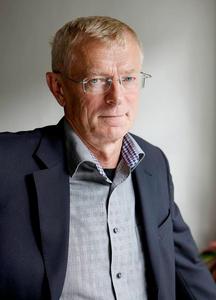
Machiko Fukuhara
Machiko Fukuhara received the 2022 IAAP Distinguished Professional Contributions Awards, in recognition of a lifetime of outstanding contributions to the practice of psychology. She recently published her award lecture in the IAAP bulletin.

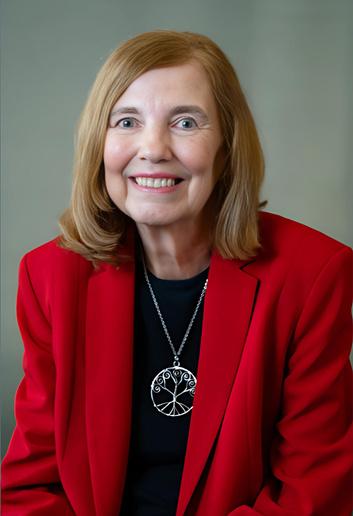
Merry Bullock / Claudia Zuniga
Merry Bullock and Claudia Zuniga have completed a special issue on Internationalization in Psychology for Trends in Psychology Their editor’s introduction is titled: “Internationalization of Psychology: Indicators, Challenges, Benefits and Risks.”
Niels Rygaard / Elaine Congress
Elaine Congress and Niels Rygaard, ICP 2023 Human Rights award winner and Uwe Gielen and past President of ICP have edited: Children Around the World, the 4th book in the UN book series sponsored by PCUN

Ani Kalajian
Ani Kalajian was featured in a CNN news article online which discussed the psychological impact of hostage detainees.
We welcome submissions for this space!
Please share your work, accomplishments, and/or awards
Your ICP colleagues are excited to hear about what you are up to!
Member Accomplishments 27 THE INTERNATIONAL PSYCHOLOGIST vol. 64 no.01
InternationalSocietyofPoliticalPsychology........................................
July4-7,2024,Santiago,Chile
11thEuropeanConferenceonPositivePsychology................................ July10-13,2024,Innsbruck,Austria.
InternationalCouncilofPsychologists.......................................................... July19-20,2024,PragueCzechRepublic
TheInternationalCouncilofPsychologistsisnowaccepting abstractsforposters,paneltalks,androundtablediscussions!
Pleasecontactinfoicpinc@gmail.comformore informationorreachouttoDr.MerryBullockorDr.ÉrinnCameron.
InternationalCongressofPsychology....................................................
July21-26,2024,Prague,CzechRepublic
CommunicatingClimateHope2024.......................................................
Counteringeco-anxietyandclimatedoomisminr esearchandpractice
August15-16,2024,co-locatedatUniversityofBritish ColumbiainVancouver,Canadaandat TilburgUniversityintheNetherlands
AbstractsubmissiondeadlineisApril8th,2024.
LeipzigUniversitywillhostaninternationalPhDcourse.....................
TitledResearchMethods,PublicationStrategiesandCareer PerspectivesinSportPsychologySeptember2-6,2024. RegistrationopensMarch1,30spacesavailable.
XIIICongressoIbero-AmericanoDePsicologia
September25-27,2024,Abstractsubmissionsongoing.Lisbon,Portugal.
6thInternationalPsychologyCongressinKenya(IPC2024)
November25-29,2024;KilifiBay,Kenyaconventions@kenyanpsychology.org
2025
International Council of Psychologists (ICP) Annual Conference April 2025, Netherlands
International Conference on Environmental Psychology (ICEP 2025)........... June 15-18, 2025, Vilnius, Lithuania, Stay tuned for the official conference website, launching in March 2024. 2026
31st International Congress of Applied Psychology (ICAP).............................. 21-25 July, 2026, Florence, Italy
CONFERENCES / WORKSHOPS / COURSES 2024
link link link link link link link 29 THE INTERNATIONAL PSYCHOLOGIST vol 64 no 01 Announcements link

If you would like to propose a topic for the ICP webinar series, please reach out to our new ICP webinar chair, Dominique Eugene breathe@dominiqueeugene.com
ICP Webinars are free and open to all, but registration is required CLICK

May 23, 2024 9 am EDT / 3 pm CET
and
George Drazenovich, Lakehead University, Canada Aligning Human Rights Psychology
the Ecological Crisis
REGISTER
DOMINIQUE EUGENE WEBINARCHAIR ICP WEBINARS 2024 30 THE INTERNATIONAL PSYCHOLOGIST vol 64 no 01 Announcements
HERE for 2024 schedule

From the Editor


Greetings and a warm welcome to the Spring 2024 issue of The International Psychologist, an official ICP publication! As the editor, I am thrilled to introduce our revamped format, designed to enhance your reading experience. Our ICP newsletter now offers a more dynamic and interactive platform, aiming to foster greater engagement and collaboration among international psychological professionals and friends. I encourage you to explore its new features and share your feedback as we strive to tailor the format and content to meet the evolving needs and interests of our members.
I extend an open invitation for submissions of all kinds. Whether you wish to share your latest research findings, insights from clinical practice, or reflections on current trends and issues in psychology, I look forward to receiving your contributions to share with ICP colleagues. You can find more information on the guidelines for submitting materials here: https://icpweb.org/icp-newsletter/call-for-newsletter-materials/
I’m honored to serve in this role as editor. Please feel free to reach out to me at any time with comments, suggestions, or your submissions.
Dr. Érinn C. Cameron
Editor, The International Psychologist
InternationalPsychologist@icpweb.org
31
THE INTERNATIONAL PSYCHOLOGIST vol 64 no 01 From
Editor
the

A NOTE ON SMART RECOVERY
F. Michler Bishop, Ph.D.
Have you ever suggested SMART Recovery to a client who does not resonate with 12-step programs?
SMART is an alternative It is not better but it is different Some of my clients and group members attend both, partly because AA may offer more of a sense of community, e.g., fellowship, than SMART. SMART members like the focus on learning new skills to manage their thoughts, feelings and behaviors. And they like that they may bring up any form of addictive or semi-addictive behavior, including overwatching porn, binge-watching TV series, gambling, and overeating Based primarily on cognitive-behavioral principles and exercises, SMART’s approach also includes aspects of Motivational Interviewing, mindfulness and acceptance, and a strong emphasis on no shame or blame No one counts days and there are no sponsors involved Meetings, both face-to-face and online, are generally lay-ed and last 60 or 90 minutes Anyone, lay person or professional, can take the training and volunteer to run a meeting.
You can obtain more information by going to smartrecovery.org, or if you have any questions, I’d be happy to text, email or talk with you
F. Michler Bishop, Ph.D.
Private Practice, CBT+ (cbtplusglobal com)
Senior Staff Psychologist, retired
Albert Ellis Institute, New York, New York
Associate Professor, emeritus
SUNY College at Old Westbury
Fellow, Psychologists in Independent Practice, APA
Fellow, Society of Addiction Psychology, APA
Author: Modern Integrative Counseling and Psychotherapy (pub Feb 2024); Managing Addictions: Cognitive, Emotive and Behavioral Techniques; and Am I Addicted? 64 Questions and Answers to Help You Change an Addictive or Semi-Addictive Behavior
(https://amzn to/3eu1RYY) Now in Spanish, ¿Soy Adicto? (amzn to/3j3EmKC) WhatsApp: +1-917-414-9660
Member Submissions 32
THE INTERNATIONAL PSYCHOLOGIST vol. 64 no.01
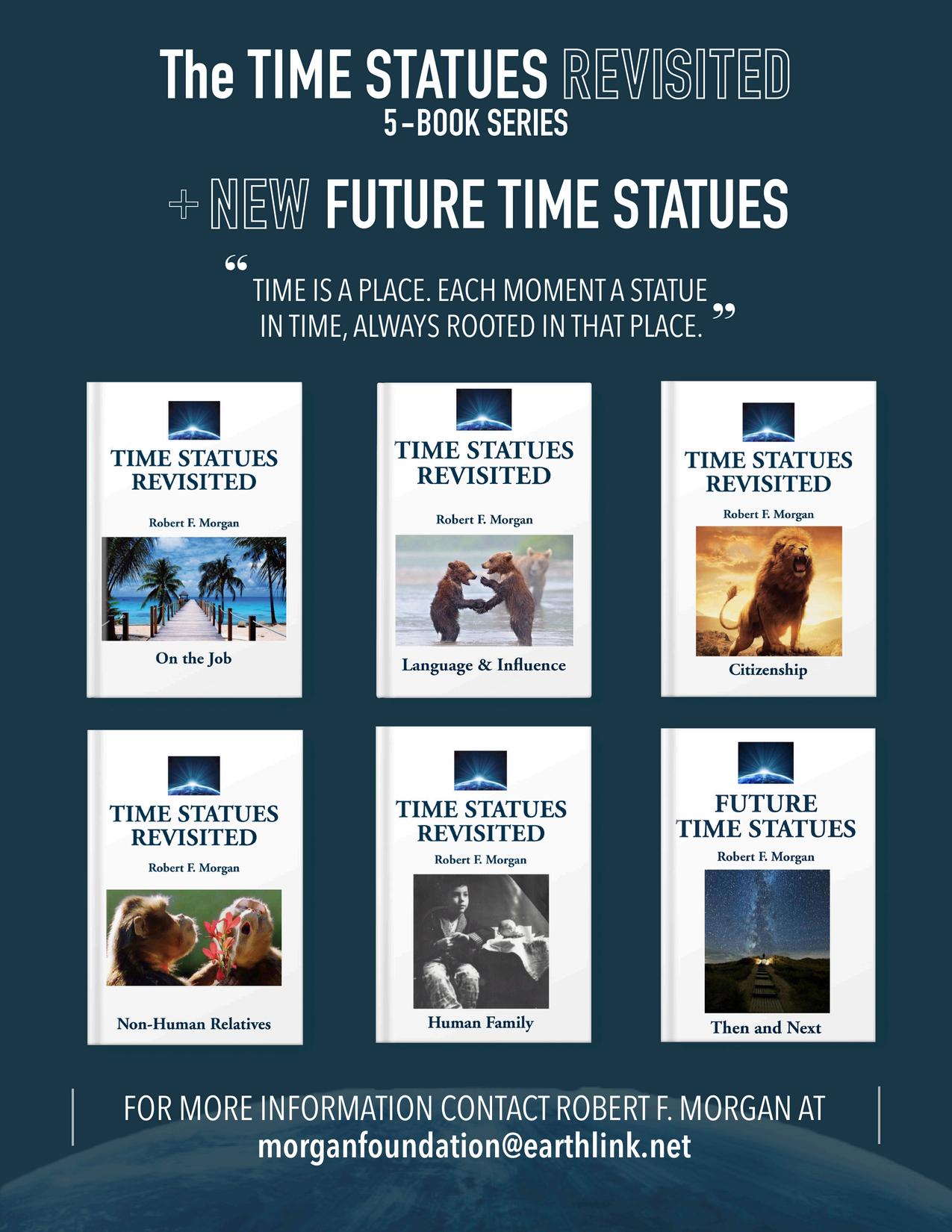
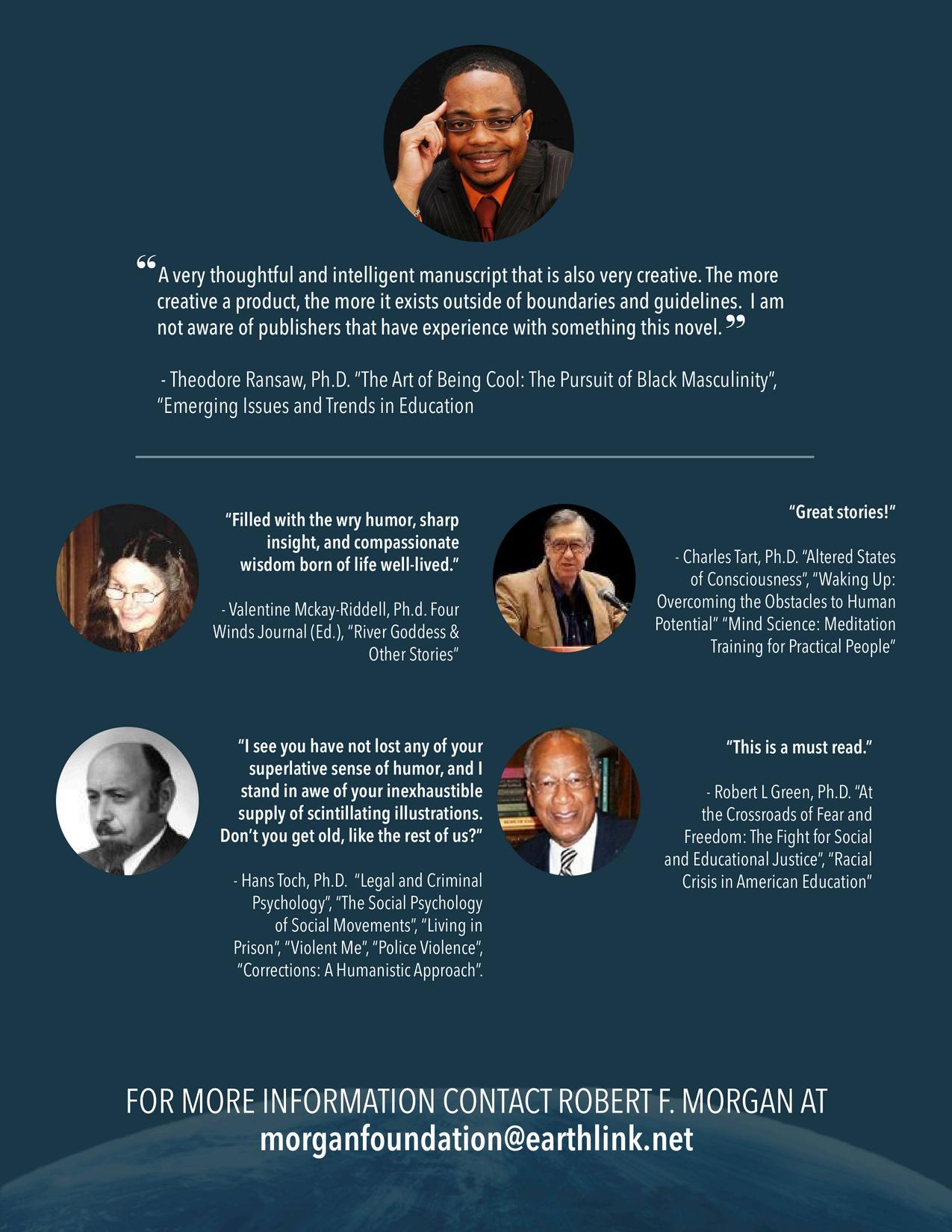

SPRING 2024 Vol. 64 No.01 www.icpweb.org Published by the International Council of Psychologists 2024



















































